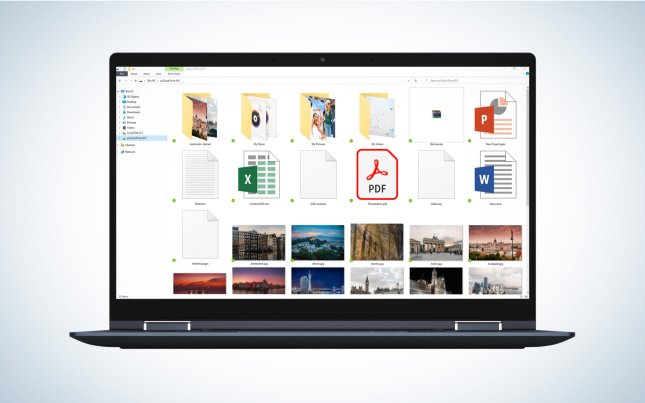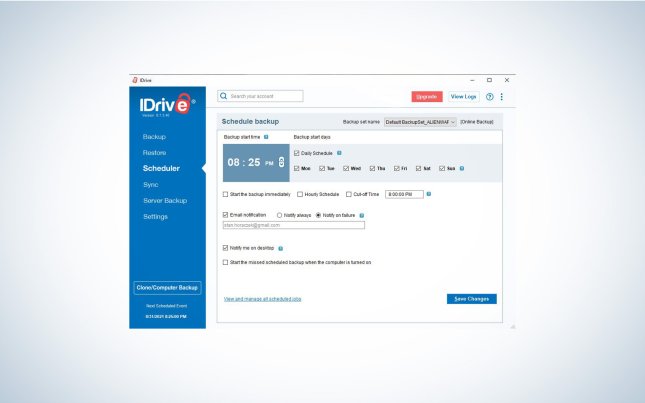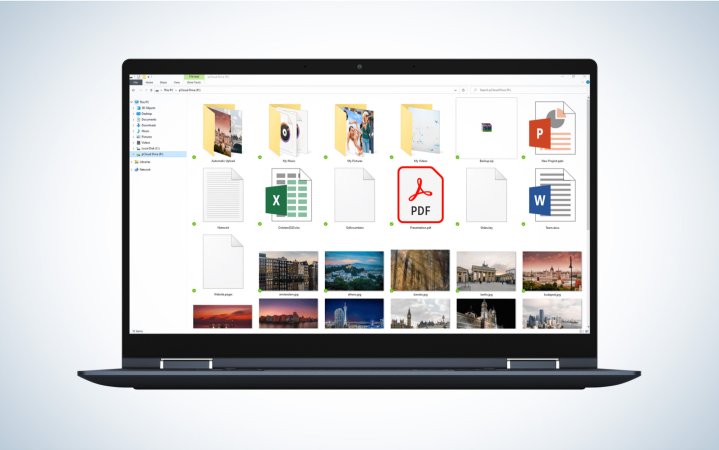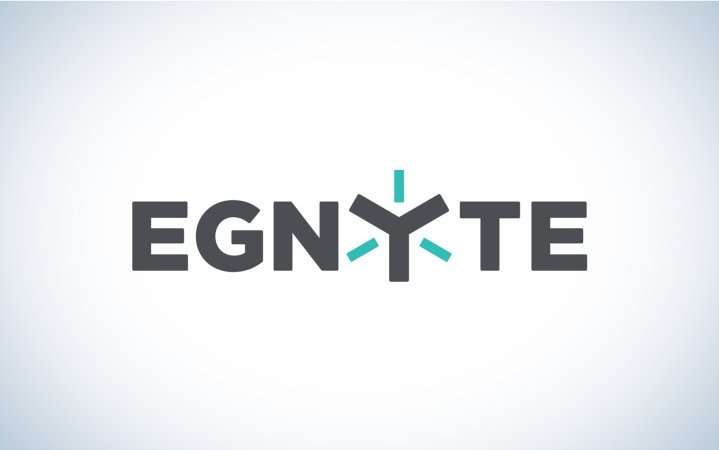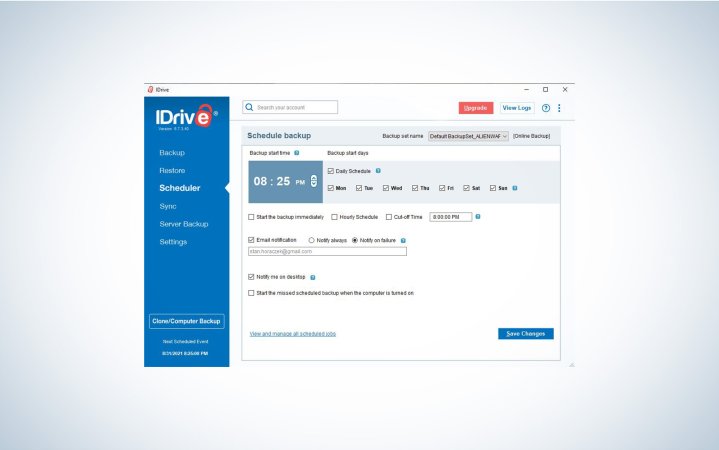We may earn revenue from the products available on this page and participate in affiliate programs. Learn more ›

If you’ve never used it before, cloud storage is a game-changer. The ability to seamlessly share files and folders with friends or work colleagues, back up thousands of photos automatically, or sync your most important work across all your devices will instantly make your digital life more manageable. What’s more, we’re flush with options from big names like Dropbox and OneDrive to lesser-known competitors like pCloud and Icedrive.
The challenge is finding the right combination of features, security, compatibility, and price that matches your cloud storage needs.
There’s no one-size-fits-all in the world of cloud storage, but after a lot of research (and only about 15 cups of coffee), we’ve landed on six options that will suit the vast majority of readers. Whether you’re looking for the best cloud storage overall, the best cloud storage for personal use, or the most cloud storage you can get for free, we’ve got you covered.
- Best overall: pCloud
- Best personal: Microsoft OneDrive
- Best for businesses: Egnyte
- Best for photos: Amazon Photos
- Best for both storage and backup: IDrive
- Best on a budget: MEGA
How we selected the best cloud storage services
You’re probably familiar with the big names in cloud storage, file syncing, and cloud backup. What you may not know is that there are many high-quality competitors out there trying to lure users away from Dropbox, OneDrive, Google Drive, iCloud, etc. with better security and tons of unique features. When selecting the services on this list, we considered key features like security and encryption, ease-of-use, file sharing and syncing, compatibility with various desktop and mobile operating systems, versioning support, inconvenient limitations or fine print, and, of course, the cost for monthly, yearly and, where available, lifetime plans.
Because of the wide array of features we considered, a couple of the biggest names like Google Drive and Dropbox didn’t make the cut. In both cases, privacy concerns and the lack of encryption kept both of these options from cracking our list.
The best cloud storage services: Reviews & Recommendations
Best overall: pCloud
Best overall
Overall champ
Why it made the cut: pCloud is one of the most well-rounded cloud storage solutions on the market, combining tons of features with an easy-to-use interface, military-grade encryption, and a variety of affordable plans.
Specs:
- 10GB free
- No file size limitation
- 256-bit AES encryption
Pros:
- Great built-in media management tools
- Offers lifetime plans
- Extensive file sharing features
Cons:
- Zero-knowledge encryption costs extra
pCloud—our pick for the best cloud storage— offers all of the user-friendly features and affordable pricing of big names like Dropbox and Google Drive. Even better, it comes without the privacy and security concerns that often crop up when you rely on a “big tech” company for your cloud storage needs. Try as we might, we’re having a hard time finding any missing features with pCloud: there’s extensive file sharing functionality, 256-bit AES encryption on all files, mobile apps that automatically backup your photos and videos, built-in media players, and automatic versioning so you can recover folders or files you accidentally deleted for up to 30 days.
The only knock against pCloud is that an extra layer of client-side “zero knowledge” encryption, where only you have access to the encryption key, costs extra. You have to plunk down an additional $125 (one-time payment) or $50 per year for this feature, which some cloud storage services provide by default.
Best personal: Microsoft OneDrive
Best personal cloud
Life storage
Why it made the cut: Microsoft OneDrive is the most convenient cloud storage solution thanks to its seamless integration with Windows, excellent collaboration tools, and wide range of plans to choose from, some of which include a subscription to Office 365.
Specs:
- 5GB free
- Built into Windows 10
- Microsoft Office integration
Pros:
- Seamless file syncing across devices
- Good file sharing support
- Excellent document collaboration
Cons:
- Limited security and encryption
- Poor versioning
As a cloud storage solution for file syncing and file sharing, Microsoft OneDrive is the most convenient option out there and the best personal cloud storage. It’s on the same level as Dropbox or Google Drive, but benefits from additional features like seamless integration with Microsoft Office, excellent collaboration features, easy-to-use file-sharing tools, and solid support for a variety of operating systems and devices. If you’re a Windows 10 user OneDrive comes pre-installed on your system, but even if you’re not, the MacOS and iOS implementations are virtually indistinguishable from PC and Android versions and work well for syncing important files cross-platform.
OneDrive does support some file versioning, but this is very limited and we wouldn’t recommend using it as a heavy duty backup solution. However, for personal cloud storage, it’s hard to argue with OneDrive’s convenience appeal—if nothing else, it’s ubiquitous.
Best for businesses: Egnyte
Best cloud storage for business
TCOB
Why it made the cut: If you need to hit large scale for many users, this option can handle it.
Specs:
- $10 per user per month
- Deep integration with other apps
- Built-in task manager
Pros:
- Support for client-side encryption
- Tons of app integrations and add-ons
- Reasonably priced
Cons:
- 100GB file size limitaiton
- No unlimited storage tier
The best cloud storage for business is Egnyte. Egnyte comes in four different flavors for business users depending on the size of your team and what sort of advanced features you’re looking for. The two main tiers that are available to purchase online are Egnyte Team for 1 to 10 users at $10 per user per month and Egnyte Business for 10 to 100 users at $20 per user per month. Both of these tiers offer 1TB of base storage with a 100GB file size limitation, basic encryption, and two-factor authentication, compliance with a wide range of common data security laws like HIPAA and the GDPR, and tons of content collaboration features, including a built-in task manager.
On top of all this, there’s a wide range of add-ons and app integrations that set Egnyte apart from other, more basic options like Box, OneDrive, or Dropbox, including integrations for Slack, Office 365, Google Workspace, AWS, SalesForce, and more.
Best cloud storage for photos: Amazon Photos
Best cloud storage for photos
Digital shoebox
Why it made the cut: Amazon Photos offers full-resolution photo and video storage with support for all the most common formats, including a few RAW files. And if you have an Amazon Prime account, you get unlimited photo storage for free.
Specs:
- Full-res photo and video storage
- Automatic smartphone backup
- Share storage with up to 5 people
Pros:
- Prime members get free unlimited photo storage
- “Family vault” lets you share unlimited storage with up to 5 people
- Auto-sync feature automatically backs up your photos
Cons:
- Video storage is limited to 5GB, even if you have Amazon Prime
- Extra storage is more expensive than the competition
Earlier this year, Google made headlines when they stopped offering unlimited “high-quality” photo storage, but few people realize that Amazon does the same thing, only better. Amazon Photos is our pick for the best cloud storage for photos. If you’re one of the roughly 200 million Amazon Prime subscribers worldwide, you have access to free, unlimited, full-resolution photo storage through Amazon Photos. As an added bonus, Prime members can invite others to be a part of their “Family Vault,” which allows you to share your unlimited photo storage with up to 5 people.
Backing up your photos is easy, either on the web, through the desktop app, or via the mobile app, with support for automatic backup included.
There are a few minor limitations. Namely, Amazon Photos only supports a small number of RAW photo formats, and video storage is still limited to 5GB unless you pay Amazon for more. But given the other benefits that come with a $13/month Prime membership, unlimited full-resolution photo storage seems like something more people should be taking advantage of.
Best for both storage and backup: IDrive
Best for storage and backup
Rescue ranger
Why it made the cut: IDrive is a hybrid cloud storage and cloud backup solution, and the best option if you want the best of both worlds: full device backup and recovery, as well as online storage/syncing of your favorite files and folders.
Specs:
- 5GB free
- Robust file syncing
- Full device backup and recovery
Pros:
- Support for multiple device backup and recovery
- Encryption is standard
- Very affordable compared to most other options
Cons:
- Limited file sharing support
- All plans are pay-by-year
IDrive is a hybrid cloud storage and backup solution that offers users the best of both worlds. You still get to choose a bespoke folder that will sync across multiple devices and operating systems, just like with pCloud or OneDrive, but you also get access to multiple device backup with robust versioning and recovery options. IDrive will even protect you from ransomware attacks by taking regular “snapshots” of your system and letting you rewind the clock to a previous version, and 256-bit AES “zero knowledge” encryption is standard.
The only thing keeping IDrive from winning “Best Overall” is the relatively limited file sharing features and the fact that paid tiers are all pay-by-year. Fortunately, even at those yearly rates, IDrive is extremely affordable.
Best budget: MEGA
Best on a budget
Affordable storage
Why it made the cut: No other service offers this much storage for free. If you’re looking for a secure place to store a lot of files without paying a dime, MEGA is your best bet.
Specs:
- 20GB free storage
- Zero-knowledge encryption
- Secure chat with end-to-end encryption
Pros:
- More free storage than anyone else
- Intense focus on security and privacy
- Wide range of desktop and mobile apps, including Linux and Harmony
Cons:
- Paid tiers are more expensive than the competition
- Limited app integration and collaboration
MEGA has two key features that make it worth a look: they offer a massive 20GB of free storage, and they put an intense focus on privacy and security. Their paid tiers are a little bit more expensive than feature-rich options like pCloud, but as a budget option, MEGA’s 20GB free tier is unbeatable. Especially since free members benefit from all the same zero-knowledge multi-layer encryption features as everyone else. MEGA also offers a wide range of device support, including a desktop app for Linux and a mobile app for Huawei’s Harmony operating system, as well as a built-in chat feature that’s end-to-end encrypted. You could say they’re big on security…
Where MEGA falls short is convenience. Because of their laser focus on security and privacy, you won’t find any sort of app integration or useful collaboration features through Google Drive or Office 365. But if that doesn’t put you off, or if you’re simply looking for the most storage at the lowest cost, MEGA offers 5GB more than any other service worth using.
Things to consider when picking a cloud storage service
There are a lot of factors to consider when selecting a cloud storage provider. Beyond the basic questions like how much storage you need, how much you’re willing to pay, and what kind of files you’re planning to store, there are three main factors that we think every buyer should consider very carefully.
Cloud “Storage” vs Cloud “Backup”
There’s a subtle—but important—difference between cloud storage and cloud backup. Cloud storage services focus on syncing discrete files and folders across devices and allowing you to share certain files and folders with friends, family, and business associates. Picking which items you want to put in the cloud is usually a manual process, with a “sync” folder predefined on your computer and only a little bit of automation built-in for things like photo and video backup.
True cloud backup is more comprehensive. The point of a cloud backup is to copy your entire computer (or multiple computers) onto a server. Once that initial copy is made—sometimes manually—the cloud backup service will automatically update the backup every time you add or remove something, keeping multiple versions or snapshots of your data going back in time so that you can literally go back in time and recover files that you may have deleted by accident, or restore your whole system in case of a catastrophic failure.
On this list, we’re focusing mainly on cloud storage solutions, but we did call out one service that delivers the best of both worlds.
Big Names vs. Newcomers
Another important thing to consider is whether you want to trust your data to one of the big names—Google, Apple, Dropbox, Amazon, Microsoft—or go with one of the lesser-known providers like IDrive, pCloud, or MEGA.
Generally speaking, the smaller companies are more focused on providing the best possible experience with a focus on certain key features, better security, and the widest range of plans for both personal and business use, while the big names can afford to charge less for more storage and may offer better integration across a wider variety of apps, operating systems, and devices. One isn’t necessarily better than the other, but you have to consider your own needs and preferences and choose accordingly.
Monthly Subscription vs Lifetime Plan
Finally, we also recommend considering exactly how you want to pay for your cloud storage solution. Most of the big names offer monthly subscriptions with a discount if you pay for a full year in advance, but some providers give you the option to pay a large one-time fee for a “lifetime” plan. It’s sort of like buying a large hard drive and storing it at the company’s data center, rent-free.
The subscription model works for many people, but if you only want to back up a specific set of files on the cloud, or you’re confident that you’ll never go above and beyond a certain amount of storage, a lifetime plan may be the more affordable and sensible option over the long term. Just make sure the company you pick is a stable, trusted name in cloud storage—the “lifetime” in “lifetime plan” will only last as long as the company stays in business.
FAQs
Our pick for the best cloud storage for personal use is Microsoft’s OneDrive. While it doesn’t offer the kind of security and encryption you’ll find with our overall winner pCloud, OneDrive includes excellent collaboration tools, seamless integration into the Microsoft Office suite, great photo management, well-developed file sharing functionality, solid compatibility across devices and operating systems, and a range of different plans to choose from. OneDrive wins this category on the basis of sheer convenience.
There are a few companies that offer unlimited tiers, usually targeted at business clients, but there is no company that offers free unlimited cloud storage for all of your files. If you have an Amazon Prime account you get “free” unlimited photo storage (see above), and Google Photos will store unlimited photos for free after compressing them and resizing larger photos to a maximum of 16MP, but that’s obviously limited to photos. For other files, we’d recommend looking into MEGA, who offers a whopping 20GB of storage for free—the most of any company we’ve found.
In terms of price, the answer is yes. iCloud storage is reasonably priced, offering up to 2TB of storage for $9.99 per month (in the US). But we would only recommend it if you live exclusively in the Apple ecosystem. While options like Google Drive, Amazon Drive, and Microsoft OneDrive often play nicer with the products and services designed by their parent companies, Apple’s iCloud is highly integrated into the Apple ecosystem. If you use a PC or Android phone, we’d suggest going with another service like OneDrive, that can still work well on Macs and iPhones, but won’t lock you into Apple land forever and always.
A final word about the best cloud storage services
- Best overall: pCloud
- Best personal: Microsoft OneDrive
- Best for businesses: Egnyte
- Best for photos: Amazon Photos
- Best for both storage and backup: IDrive
- Best on a budget: MEGA
Now more than ever, there are tons of options available that deliver safe, reliable, user-friendly cloud storage for every use case and budget. Whether you’re looking for personal cloud storage to keep your devices in sync, business focused storage for collaborating with coworkers, or a place to back up unlimited photos, there’s a convenient solution available in the cloud. You just have to know where to look.
